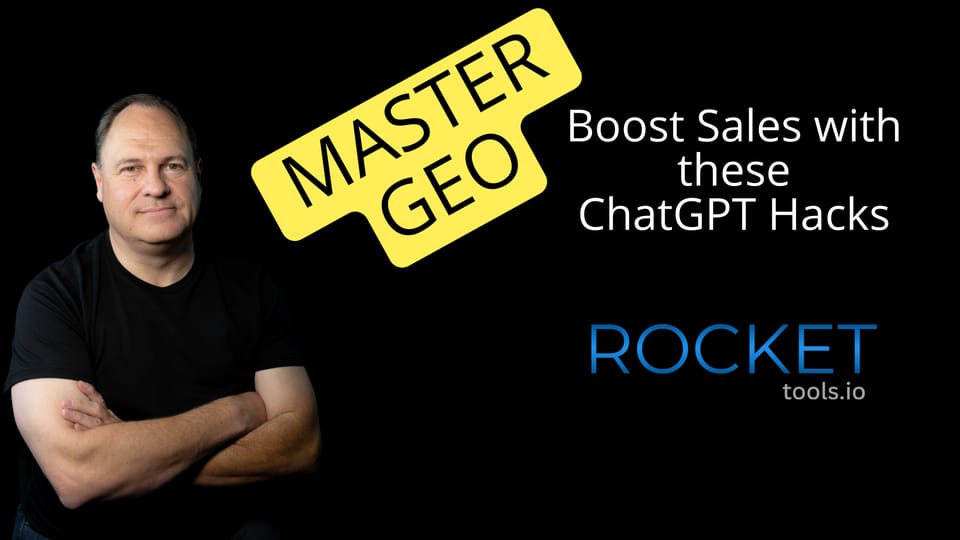From SEO to GEO: How to get found on ChatGPT

I remember when ranking #1 on Google was the holy grail of digital marketing.
Those days are fading fast.
Just last week, I watched my daughter ask her phone where to find the best Dim Sum nearby. She didn't scroll through search results or click any links. She got an instant answer, complete with ratings, prices, and directions.
This is the new normal, and it's changing everything we know about digital marketing.
Welcome to the age of generative search.
The Rise of Answer-First Search
Remember when we used to type keywords into Google and click through pages of results? That's becoming as outdated as dial-up internet.
Today's users want instant answers, not links to wade through.

I've seen this shift happen right before my eyes. Many of my clients are getting a boost from more traffic from AI-powered recommendations than traditional search results.
That is certainly happening at our own brand, Hill Country Chocolate.
This isn't just another tech trend. It's a fundamental change in how people find and choose businesses online.
And it is changing how we create and promote content in 2025.
Think about it: When was the last time you clicked past the first search result? Or even opened one at all?
And more importantly, how frustrated are you becoming if you just get simple Google results back from an online search?
People want answers.
Making the Shift from SEO to GEO
Here's the thing: SEO isn't dead. But it's evolving into something new - Generative Engine Optimization (GEO).
The goal isn't just to rank anymore. It's to be the answer.
Let me give you a real world example from hillcountrychocolate.com.
Instead of just optimizing for "best chocolate in the Texas Hill Country," I structured content to answer specific questions like "Where can I get sea-salt caramels with two-day delivery in Texas?"
Our sales of caramels jumped 30%.
The secret? We stopped writing for Google and started writing for AI.
We put the most important information up front. We used clear headings and bullet points. We made sure every piece of content directly answered common customer questions.
This isn't rocket science. But it requires a new way of thinking about content.
Practical Steps You Can Take Today
Want to stay ahead of this shift? Here's what's working right now:
- Start with the answer. Don't bury the important stuff under fluffy intros.
- Break up your content into clear, scannable chunks. AI loves structure.
- Focus on specific, conversational questions your customers actually ask.
- Keep your content fresh and accurate. AI prioritizes up-to-date information.
- Build your authority through expert content and genuine customer reviews.
I've seen small businesses outperform major brands by following these simple principles.
Is There a Secret Weapon for GEO?
Well, maybe.
We've placed considerable bets on the resurgence of traditional public relations, or PR.
Artificial intelligence models like ChatGPT love to see their version of domain authority. And one way to really magnify that is to create a cacophony of voices around your content.
This is the reason that in late 2024, we added significant resources to RocketTools to automate press release delivery at a lower cost.
This allows businesses to repurpose dollars that they might have historically spent on ad words and keyword targeting with Google ads into earned media content with proven do-follow links.
When your site, plus others with high domain authority, all give the same answer to a question, AI is more likely to feature your site in its responses.
This isn't quite the same as backlinks in the traditional sense, but I think you can see the benefit.
The Future is Here
The way people search is changing faster than most businesses can adapt.
But here's the good news: if you adjust now, you'll be way ahead of your competition.
This isn't about gaming the system or tricking AI. It's about providing clear, helpful answers to real customer questions.
That's what worked in traditional SEO, and it's what works even better in the age of generative search.
The businesses that understand this shift - and adapt to it - will thrive. The ones that don't will wonder why their traffic keeps dropping.
Which side do you want to be on?
Let's embrace this change together. The future of search is here, and it's more exciting than ever.
Time to get started.

Member discussion